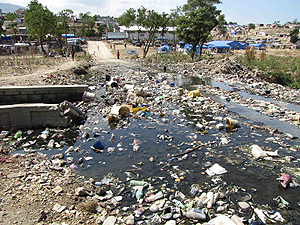When I arrived, I found out that we are working in one Port-au-Prince district called Delmas. The other "neighborhood" is a displacement camp at the border with Santo Domingo - a camp of people who fled to the Dominican Republic but have been returned to Haiti).
Each day I pass by collapsed buildings where hundreds of people are still buried. The streets are full of holes, garbage and rubble. Everywhere there are tent cities in the open spaces - tight groups of 20 to a thousand families packed into parking lots, gardens, parks - some on top of the rubble.
The camp is in miserable condition. The people are making small shelters from materials taken from the rubble. Many do not have adequate roofing. The camp is literally located in a garbage dump, surrounded by open sewage flows. Most families have no regular or reliable access to water or food. The camps have had no latrines for over four weeks, and now only five or six latrines are established for over 8,000 people. People are spending their last savings on food and clothes.
I am doing a variety of activities. Today, [February 19] I went into one of the displacement areas and organized a meeting for a child protection committee, I organized some youth to clean up a makeshift soccer field, I monitored the progress of teachers in the child-friendly space, and I helped get two abandoned children registered with the local authorities to then be placed with a woman who can care for them.
I played Frisbee with some children. I planned a teacher workshop for tomorrow, where I will help 25 teachers design children's activities on the topics of proper latrine use, staying safe, avoiding injuries in the camp, and more. We are starting some basic academics. The teachers will be guided in some exercises to help children express and share their losses and future plans. We will also work on a community protocol for the care of abandoned children.
- Tony Hoffman



